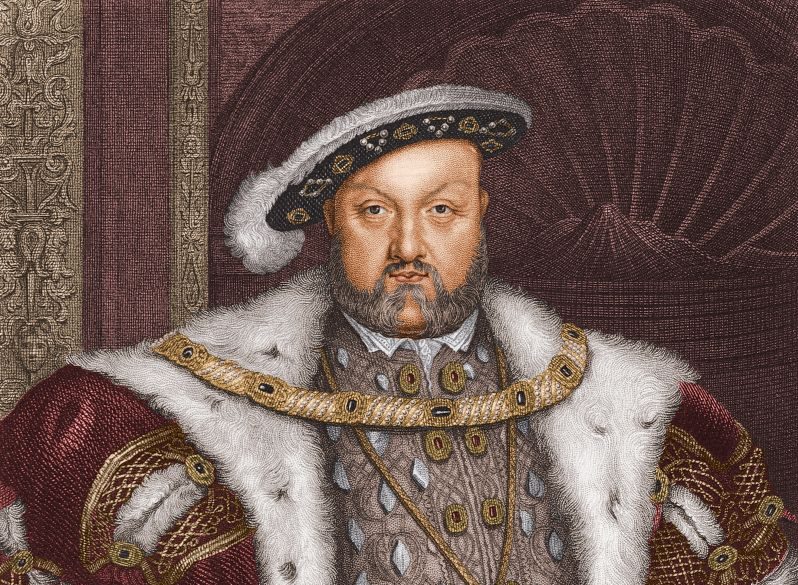Henry VIII, who was born on this day in 1509, is the only English monarch other than William the Conqueror who can claim to have destroyed a society and replaced it with a new one. Catholic apologists like Chesterton are right to see in the Henry VIII saga a sort of secular apocalypse; it was, in Chesterton’s words, the ‘dissolution of the whole of the old civilisation’. The new England that grew up in its place – by Henry’s unwitting patronage – was alien, denatured, dislocating, and altogether more worthwhile than the one that had gone before it.
The story of Henry VIII’s is the story of an eccentric clique capturing society and recasting it in its own image. From 1529-47 nearly all of England’s historic institutions were destroyed. All the things that had given life its shape and meaning were junked: the monasteries torn down and their assets made off with; guilds suppressed; commons enclosed (a fitful attempt by Cardinal Wolsey to reverse this notwithstanding); old customary rights stamped out; the cosmopolitan link to Europe severed. The old mediaeval learning was torn up by its roots and the universities refounded in the study of the Classics. It was England’s version of Jacobinism.
English society became a series of regulated games in which the prizes were glory and renown
But unlike Jacobinism, Henry-ism had no popular backing to speak of. One man’s ego; a handful of religious extremists; a few dodgy Giulliani-esque attorneys. These were sufficient to turn the world upside down. Everything that happened in those years happened in the face of settled custom, settled opinion, so-called common sense. The forces that would dominate English life for the next 400 years – Hellenic revival and religious radicalism – were alien ones, the preserve of this small Henrician circle. The reign of Henry VIII was about the conquest of reality by dreams. The England that it gave rise to would recognise no limits but the limits of its own whimsy.
The most cherished of these whimsies was Hellenism. Henry VIII’s new grammar schools and his reformed universities created a governing elite that looked more to classical Greece and Rome than to the society around them. This is something that went well beyond ‘revival’ – what took place after 1509 amounted to the splicing of England with the classical world. Later figures like Byron, Charles James Fox, or Alan Clark are unexplainable unless we account for the shrewd paganism that’s prevailed in the national psyche since Henry’s reign. Grecian stone urns in the badlands of Northumberland, Temples to Venus in Stowe: these were the physical symbols of an alien civilisation being grafted onto the old one. British people were still exclaiming the name Jove at the end of the twentieth century. There are now all kinds of debates about what Britishness really means: ‘pretending to be Greek’ is probably the best answer.
Another cadge from ancient Greece was the spirit of agon – competition. Mediaeval English society was a web of mutual obligations in which everyone had a place. Henricianism destroyed this and replaced it with a competitive free-for-all. Much like classical Greece, English society became a series of regulated games in which the prizes were glory and renown.
The England that Henry VIII created was the first to adopt school entrance exams, stock exchanges, adversarial lawyering, markets. It would also invent the Queensberry Rules, along with most of the world’s sports. What all these have in common is that they’re made-up conflicts regulated by intricate sets of rules and codes of honour. Westminster became the most dazzling game of all. Henry VIII’s reign saw the beginning of the process by which parliament was transformed from a boring Diet of burghers into an arena for people’s ambitions. As Lewis Namier tells us, by the 18th century, people came to parliament not to represent interests but to cut a figure.
Westminster, too, now accepted no limit on its powers of creative invention. The middle ages, viewed one way, was a series of interminable legal disputes between kings, barons and the Church over their rights and the proper scope of authority. The Statute in Restraint of Appeals (1532) called time on all this. In establishing parliamentary sovereignty, it declared that life would no longer turn on precedent-scraping and wrangling over fixed ‘rights’ that seemed to come from nowhere; that we might, instead, debate and decide things on their merits, revealed to us through reason. The Statute in its full meaning was a thunderclap from the heavens: one of the great triumphs of the human spirit.
The social order Henry created had to make unprecedented concessions to talent. Jacob Burkhardt tells us that the tyrants of Renaissance Italy, being illegitimate, could not rely on the church or the aristocracy to help them and had to instead turn to talented individuals of humble origin. Henry faced a similar dilemma: his claim to the English throne was shaky and the break with Rome had made him an international outlaw. It was this isolation that gave rise to ‘new men’ like Thomas Cromwell, Thomas Audley, Richard Rich, William Paget, and – in the reign of Elizabeth – William Cecil.
What began as a temporary expedient soon became a permanent part of the social system. For the next several centuries anyone who was good at their job in England was simply ennobled and made part of the Establishment. With this act, Henry VIII set off the primordial conflict between the ‘new men’ and the old aristocracy that would shape the country’s history for the next 300 years. After the fall of the Pittite regime – the last great flowering of the new men – the cabinet of the Earl Gray (the most blue-blooded in living memory) would pass the Reform Bill of 1832 as a means to finally flush out their old class enemy, birthing liberal democracy in Britain largely out of spite.
Amid all this, Henry seems like a man out of time, eerily out of place in his own age. He appears to us as a Subjective Man of the 19th century – full of introspection, rumination, and self-reproach. In him we can see all the defining traits of a modern person. The capacity for romantic love. The prickly amour-propre. The consuming neediness. Henry is familiar to us in a way that the Sun King Louis XIV – who lived 150 years later – is not.
When Henry VIII came to the throne, England was a normal European country. By 1700 it was a lunar landscape: its countryside a work of complete artifice, with shaped topiaries, carved hedges and artificial lakes; blasted heaths created by deforestation; farmers replaced with sheep by Act of Parliament; dotted everywhere with imitation Greco-Roman temples. Its neighbours thought its people were dangerous lunatics and had only recently ceased to treat it as a rogue state. By pure will, England had been made as remote and peripheral to the continent as Russia.
Does the England that Henry VIII created still exist? The grammar schools have largely been abolished and the last of England’s pagan virtues were exorcised by New Labour. The country is once again ruled by dull landowners who believe in human rights.
One part remains. Parliamentary sovereignty – the master-mechanism of Henry’s system – is still in operation. If the English people should ever tire of their ‘Rolls Royce’ institutions, their fixed international obligations, or what’s being demanded of them in the name of human rights, then they, uniquely in the western world, have the ready means to change them. It’ll be there to hand – should the English ever want to turn the world upside down again. The idea that we can examine the values and systems by which we’re ruled, find them wanting, and choose different ones; or, really, the idea that the world belongs to the living. That is Henry’s ultimate bequest.







Comments